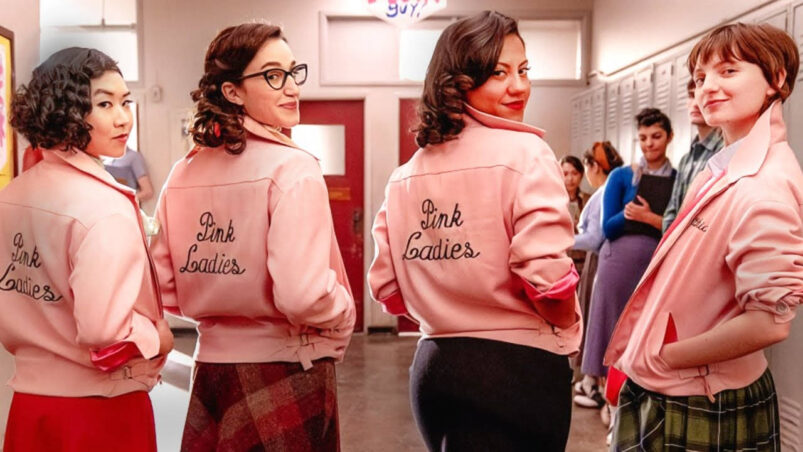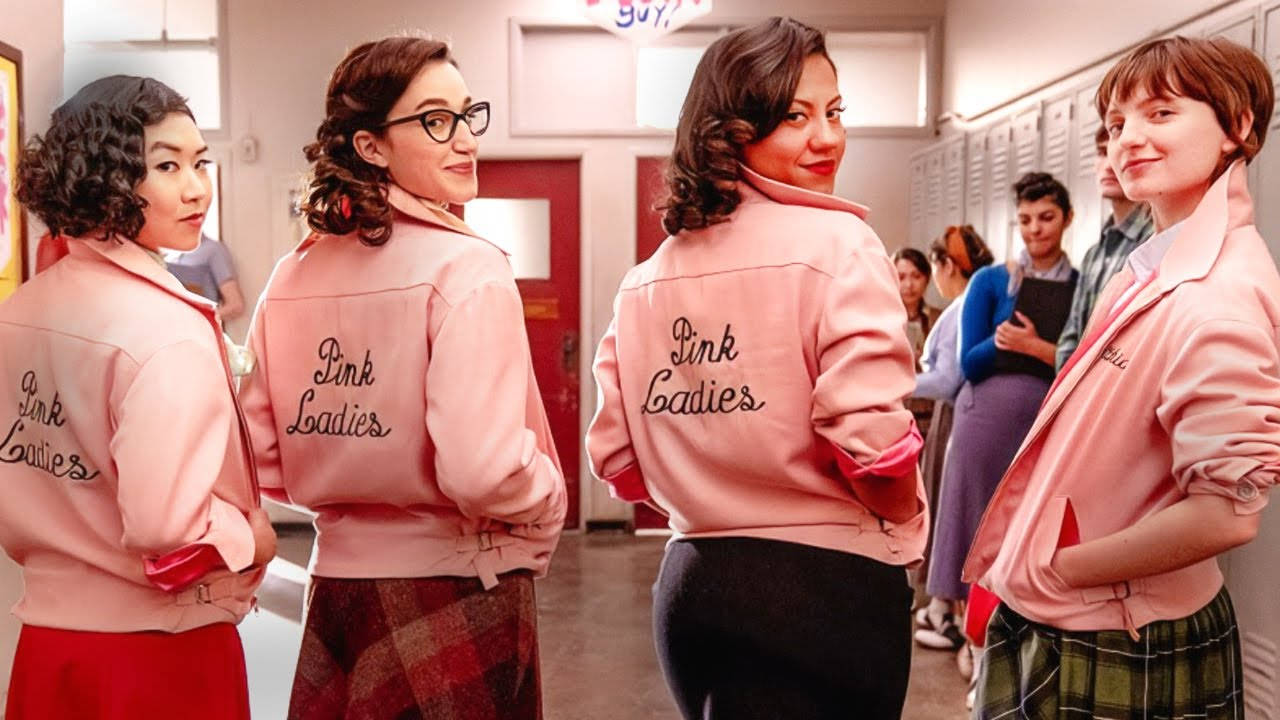Teen movies have been obsessed with female friendships lately. The Edge of Seventeen, Lady Bird, Booksmart, Little Women, Banana Split, and Unpregnant all feature young female protagonists whose female best friends play much bigger roles than just the sidekicks. The same can’t really be said for teen shows, though, so it’s pretty cool on paper that Grease: Rise Of The Pink Ladies decided to take this route as well.
A prequel show to the 1978 film Grease, this musical show follows the original members of the Pink Ladies, Jane, Olivia, Cynthia, and Nancy, as they deal with things like high school, romance, familial problems, and finding their place in the world.
I really like the decision to take this route — I’ll always be supportive of more movies and shows having a heavy focus on platonic love — but it’s the execution I have a serious problem with. See, in some of the female friendship titles I mentioned above, the story ends with the protagonist not ending up with a boyfriend, but realizing she doesn’t need one because she has her best friend.
I guess you could see this as them choosing friendship over romance, but I wouldn’t agree. Both can be extremely important to an individual, so I don’t hate Grease: Rise Of The Pink Ladies’s decision to have these girls want both friendship and romance in their lives.
My problem is that despite the many proclamations from the characters about how wonderful and important female friendship is, the show still prioritizes romance far more than it does friendship. There’s a scene where Nancy proclaims that the other Pink Ladies would never desert her for a boy, but I am really, really not convinced. So much of this show — and I do mean so much — is dedicated to these girls and their romantic drama.
There’s a story thread where Jane runs for student council. She ends up having romantic drama with her opponent. Cynthia joins the theatre club. She ends up having romantic drama with one of the other club members. Olivia gets involved with the school paper. Wouldn’t you know it, she ends up having romantic drama with someone on the staff.
Despite the proclamations about how these girls are so much more than just girlfriends and wives, the show still thinks the most interesting conflicts for each of the main Ladies are ones relating to unhealthy romances. These girls’ interests in politics, theatre, and journalism don’t get proper arc conclusions and are almost completely forgotten in favor of them falling in and out of love with different people.
Even Nancy, the Lady who actively claims to enjoy being single, gets caught up in her own romantic drama, despite the fact that the show applauded her in the first half for being so independent. In Episode 2, Nancy gets upset with her three friends for caring so much about boys to the point where they forget to prioritize each other, which leads to an entire musical number called, “World Without Boys.”
“Imagine no fighting over attention!” the song goes. “Imagine forgetting your posture and poise! Imagine a world without boys!” So why does Nancy need a boyfriend then? Can this show not think of a storyline for her — for any of these girls — that doesn’t involve romance? The bigger challenge here isn’t imagining a world without boys, but imagining this show without boys.
I actually had to laugh when I realized that four female characters in this show were all simultaneously dealing with their own love triangles. The theatre club even does Romeo And Juliet and the characters remark about how shallow the romance is, as if the romantic relationships presented in the show are any healthier.
It all feels so hypocritical, and when the four girls have their moments proclaiming how much they love each other, it feels forced and fake. “You don’t need a mister, you just need your sisters!” one song claims. How can I believe that when the majority of the show doesn’t even focus on their friendship, and when it does, the girls mostly talk about boys?
So Grease: Rise Of The Pink Ladies doesn’t succeed as a female friendship story, and it also doesn’t succeed as a musical. With 31 songs in its soundtrack, each episode has an average of around three songs per episode, and with each episode being around 50 to 60 minutes, this just isn’t enough. There were so many moments where I simply forgot I was watching a musical. Too often, so much time passes without a song that when they do sing one, it can actually catch you off-guard.
The songs also aren’t catchy or memorable and many of them are staged like music videos, so the plot doesn’t really progress when they sing. Take the song Someone In The Crowd from the musical film La La Land. While the characters are singing this song, they get themselves ready for a party, go to this party, and interact with people at this party. The plot is actively progressing within this number, so if you remove it, a chunk of the plot would be missing.
In many of this show’s musical numbers, the characters mostly either just dance wherever they are or symbolically dance in their imaginations, so you could remove these songs and the story would still make decent sense. Take the number Merely Players, a song that happens after Cynthia kisses someone. This number takes place in her imagination and it’s basically just her being surprised that she liked the kiss.
You could remove this musical scene and easily take away that Cynthia liked the kiss because of how nervous she is afterward, and because no plot progression happens, everything remains the same plot-wise before and after the song. It makes the entire song feel unnecessary, and because this happens so often, many of the numbers feel like they break the flow of the story instead of enhancing it.
It has to be said, though — Grease: Rise of the Pink Ladies is a gorgeous-looking show. Wow, is the production value fantastic with this one. The set designs, colors, costumes, make-up and hair work, and cinematography all look incredible. You can feel the big budget being used to its full advantage.
The cast is pretty great, too, and they all look like they’re having fun, especially during the musical numbers. Tricia Fukuhara in particular shines as Nancy, but I’d say every actor here feels perfectly cast, which only adds to how upsetting it is that most of the time, they’re either singing boring and unnecessary songs, or going through lazy rom-com clichés. These Pink Ladies deserve a much better show than this one.
READ NEXT: Make the Case: 5 Essential Non-Godzilla Movies by Ishirō Honda
Some of the coverage you find on Cultured Vultures contains affiliate links, which provide us with small commissions based on purchases made from visiting our site. We cover gaming news, movie reviews, wrestling and much more.




